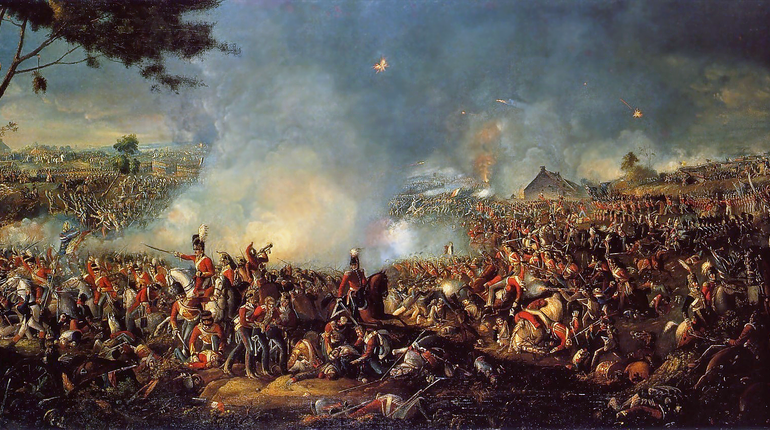This is a guest article by Charles J. Esdaile. Charles is a professor in the Department of History at the University of Liverpool. If you would like to hear more. Book your tickets to his next talk with this link.
Waterloo: The Unknown Battlefield
One of the best-known battles in all of history, Waterloo was a truly titanic struggle that finally put an end to the career of Napoleon Bonaparte, an event that resonates in popular culture and language to this day. In the words of the famous song, ‘My, my, at Waterloo Napoleon did surrender’ while, if the good people of Manchester (or, at least, those who wear red!), will forgive me, if a hitherto all-conquering football team is suddenly stopped in its tracks, more than one pundit will come up with the line that it has’ met its Waterloo).
Thus far, thus good, but how far is what happened at Waterloo actually understood. If I had a penny for every time I have heard people say that, if Napoleon had won the battle of Waterloo, we would all be speaking French, I would be a rich man indeed, but, in fact, nothing could be further from the truth. Setting aside the fact that, whilst French was its language of official communication – quite literally, its lingua franca – the Napoleonic empire was in large part governed through the local elites via the language of its constituent parts, had the emperor gained the day at Waterloo, the result would simply have been another a series of further bloody confrontations that could in the end only have had one result.
The story of how Napoleon could not possibly have triumphed in 1815 is one that would for make a fine talk, and also one that I am always happy to discuss, but, as the title suggests, ‘Waterloo: the Unknown Battlefield’, is rather based on another subject, namely the terrain over which the battle was actually fought. Very close to Brussels and adorned with monuments, museums and visitor-facilities of all sorts, the site of Napoleon’s downfall is one of the most visited of such places in the whole of Europe and possibly even the whole of the world. Yet it is a place that remains curiously unknown. In many accounts of the battle, the field is not explained at all well, while the vast majority of visitors do not stray far from the proverbial car-park. As a result, much as been missed and much has been misunderstood. In this talk, then, we will revisit the events of the battle in the context of the places where they actually happened and at the same time strike out from said car-park and, at the cost of a little shoe-leather, penetrate areas of the battlefield that are scarcely seen even by those who indulge in the bespoke tours put on by a variety of holiday companies and that despite the fact that they are infinitely more evocative than any of the spots where visitors usually congregate.
The research on which the talk is based was elaborated in conjunction with the Royal Army Museum in Brussels in the course of a project aimed at producing an e-guide to the battlefield, which will shortly be available from the Apple I-Store as a downloadable app, while there will also be a paper version in the form of a book entitled Walking Waterloo (Pen and Sword, forthcoming). In the absence of these two products, however, those interested can visit the i-Store and download an app entitled ‘The Siege of Burgos’ in which the same technology has been applied to a lost fortress in northern Spain which I rediscovered some years ago. That, however, is another story.
Charles J. Esdaile, University of Liverpool
If you would like to hear more from Charles J. Esdaile, you can book your tickets to his next talk with this link.

